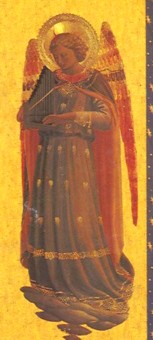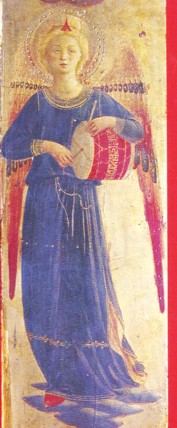On the most holy of all nights, the heavens exploded with amazing light. What had caused it? The angelic hosts, as they rejoiced in the birth of Christ Child. "No sooner had [the angel] delivered his message, but 'presently there was with him a whole choir of angels,' singing, and joying and making melody, for this 'good-will of God towards men.'" In those wee hours of the night the only people they could tell it to were poor shepherds tending their flock in the fields. "None were then awake, ... but ... poor shepherds, and to them he told it." How appropriate it was, Andrewes mused, to tell those who tended lambs "of a strange Lamb" who would "'take away the sin of the world'" and to lead them to the Good Shepherd who would give His life for His flock.
Despite the comforting and celebrating news from the Angel, the shepherds were overawed by the dazzling, heavenly light, and became afraid. To dispel such fear the Angel's words to the shepherds had to be ones of comfort. "Fear not!" he tells them. "'They were afraid,' and that 'sore afraid,' ... [so] this fear must be removed."
Hence the angel immediately announced, "'I bring you good news,'" which as Andrewes indicated means "'fear not' but be of good cheer. ... Fear no ill, there is none to fear; there is no ill, no there is good towards. For good news is good, in that it represents the good itself to us before it [comes]."
Fortified by this "good cheer" this heavenly light led the shepherds directly to the stable, in a town "full of strangers". On finding the Babe, they followed the angels in praising "God, 'for that they had heard and seen.'" And so on this most holy night
Heaven and earth and men are to join in one concert; Heaven and earth first; Heaven on high, earth beneath to take up one hymn; both in honour of His birth - both are better by it. Heaven has glory, earth peace, by means of it. ... Warranted by this song, at Your nativity, O Lord, let the heavens rejoice for the glory, let the earth be glad for the peace that come to them by it.
In analysing the Angel's message, Andrewes emphasised that the joyful anthem sung on that first Christmas night proclaimed three important message "'glory,' 'peace' and 'good-will,'" but of the three, "goodwill" is the most important for us as it signifies the "good pleasure" God showed towards His son, and in turn to us.
As man has been honoured with "favour and grace" by God's "good pleasure", Andrewes suggested that he should display his "good pleasure" by giving God more praise than he did before the coming of the holy Babe; "The point of glory much mended; God more glory than before." This in turn will make "earth more at peace, if you take peace in things spiritual, matters concerning the soul."
The message of "peace on earth" furthermore denotes the re-uniting of God and man through the holy Christ-Child. Although God had shown many favours in the past to man, none could rescue him from his fallen state. Reconciliation with God could only be accomplished when the "Godhead and manhood meet both in one". The angels thus sing "'at His Nativity of those things that came by His Nativity.' Came to heaven, to earth, to men. Glory to heaven, peace to earth, grace and favour to men. ... [This] good-will to men [is] in the midst between both, compound of both." Thus:
The Child here is God and Man. God from on high, Man from the earth. To heaven whence He is God, thither goes glory; to earth whence Man, thither peace. Then as God and Man is one Christ, and as the reasonable soul and flesh is one man; so Christ consisting of these two brings the 'fullness of God's favour,' the true and real cause of both; yielding them peace while here on earth, and assuring them of glory when there on high; as thither on high we trust to be delivered after our time here spent in procuring Heaven glory and earth peace.
The tidings of "peace on earth" is not only good news but also joyful as the Angel advised the shepherd that at the birth of a Saviour it is a night of "gaudium magnum". It is "joy" because the Lord has come; it is "great joy" because He has come to redeem mankind. And so the best joy in the world "is the joy of a man saved; no joy so great, no news so welcome, as to one ready to perish, in case of a lost man, to hear of one who will save him, [and] in danger of perishing by sickness, to hear one that will make him well again. ... It is the best news he ever heard in his life. There is joy in the name of a Saviour. ... We have therefore all cause to be glad for the birth of this Saviour."
Not only is there joy in the coming of the Christ-Child but also hope. We are no longer "hope's prisoners" as He who "should come is come. The promised Saviour, the Saviour Which is Christ is now born. ... Now there is a saving office erected, One anointed to that end, a professed Saviour to Whom all may resort. ... 'There is a name under heaven' whereby we may be sure of salvation, the Name of Christ."
Yet "Christ" must always be linked with "Lord", and so the next heralding by the angel called the Child "'Lord'".
"And yet to make our joy more full the Angel adds the third. 'A Saviour Who is Christ,' Christ the Lord, ... Lord of men and angels, Lord of heaven and earth, and all the hosts of them." Andrewes explained why it was necessary to add "lord".
As He is Christ, that is, anointed, He is man only. It is His name as Man, for God cannot be anointed. But He who should save us would be more than Man; and so, more than Christ. Indeed, Christ cannot save us. He who must save us must be the Lord ... [and] because He is the Lord, 'endures for ever,'... He [is] for ever ... [the] 'Author of eternal salvation' to all who depend on Him. ... To begin and to end; to save soul and body from bodily and ghostly enemies; from sin the root, and misery the branches; for a time and for ever; to be a Saviour and to be salvation itself; Christ the Lord is all this, and can do all this. Now then we are right, and never till now.
'Lord' goes yet further, not only to save us and set us free from danger, to deliver us from evil; but to state us in as good and better condition than we forfeited by our fall, or else though we were saved we should not save by the match. To make us then savers, and not savers only, but gainers. ... He does further impart also the estate annexed of this last title, even whatsoever He is Lord of Himself.
Andrewes quoted St. Paul who described Christ's title as the "'Lord of life,'" meaning He imparts life, while St. Peter called it "'Lord of glory,'' and thus conferring glory. These two with the title "Lord of joy" means that He makes us "lords" of "life and glory and joy". Furthermore He admits us with Himself into His estate of joint-purchase of heaven, ... that in right of it we may enter into the life, glory, and joy of our Lord, and so be saved and be savers, and more than savers every way."
Thus when we combine everything the angel told the shepherds we have
natus and Servato, Servator and Christus, Christus and Dominus, Dominus and natus; 'born and Saviour,' 'Saviour and Christ,' 'Christ and the Lord,' 'the Lord and born; take them which way you will in combination, any of the four, then have we His two natures in one Person. In Servator, His Godhead; none but God is a Saviour. In Christus, His Manhood; God cannot be anointed, man may. In Dominus, His divine again, 'the Lord from heaven.' In Natus, His human nature directly, born of a woman; both ever carefully joined, and to be joined together.
Obviously, stated Andrewes, this Saviour was quite distinct from those "saviours raised up of a sudden upon some occasion, to serve the turn for the present, and never heard of till they came." Christ was "signed and sent with absolute commission and fullness of power to be the perfect and complete Saviour of all. ... not for a time, but for ever; not to the Jews, as did the rest, but even to all the ends of the earth."
This our Saviour is also the fulfiller of all the prophets. By combining all the different roles of the past prophets such as "Aaron the Priest, Elisha the Prophet [and] Saul the King" Christ is all - Priest, Prophet and King. These offices and His kingdom will endure for ever.
This blessed birth as announced by the angel "of a Saviour Which is Christ the Lord thus furnished in every point to save us throughly, body and soul, from sin the destruction, and Satan the destroyer of both, and that both here, and for ever - this blessed and thrice blessed birth is the substance of this day's solemnity of the Angel's message, and our joy." All this we should remember when we say "Glory to God in the highest and on earth, and peace to his people on earth," suggested Andrewes.
One of the reasons that Andrewes agreed with the reciting of the Gloria after the Communion was that it is the time when we are nearest to the angels as we have just received Christ in the Sacrament. So he insisted that we always proclaim joyfully the wonderful news of that first Christmas night when the heavens were filled with glorious light.
In his Nativity sermons Andrewes challenges us to follow the examples of the shepherds and also the magi and travel to Bethlehem.
There is the rendezvous, ... there He will be first seen and saluted, there He began with us, then we to begin with Him; where He set forth, there our setting forth to be also. Indeed, there is no finding Him but there, this feast. There the shepherds found Him this day the first; there the wise men on [the] twelfth day. But thither they came both; both the shepherds directed by the angel, and the wise men guided by the stars. ...
When we find Christ the angels rejoice at the "happy epoch of our new birth." Indeed "the holy angells slap their wings, for their is joy in heaven over one sinner that repenteth. All the inhabitants of heaven will triumph at our new birth, be glad spectators of our growth in Christ, rejoyce to see us of the same mind, every day liker and liker to him, till we grow to ripenese & maturity, to be perfect men in Christ Jesus." Then with all "angels & archangels and all the company of heaven cry aloud saying, Salvation, honour, power majesty be unto him that sitteth upon the throne and to him that was made like unto us, even to the lamb for evermore."

